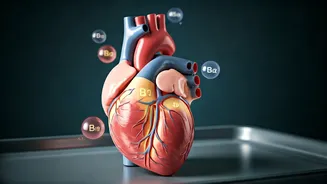Iron Deficiency Explained
Iron deficiency anemia is a significant health concern in India, affecting a large portion of the population. This condition arises when the body doesn't
have enough iron to produce hemoglobin, a protein in red blood cells that carries oxygen. Common symptoms include fatigue, weakness, pale skin, and shortness of breath. The main causes include insufficient iron intake from the diet, poor absorption of iron due to certain dietary factors, and increased iron requirements during pregnancy or menstruation. To combat iron deficiency, it's vital to increase the intake of iron-rich foods like leafy green vegetables (spinach, fenugreek), lentils, beans, and lean meats. Pairing these with foods rich in Vitamin C, like citrus fruits, can significantly boost iron absorption. In severe cases, iron supplements, prescribed by a healthcare professional, may be necessary to restore adequate iron levels and improve overall health.
Vitamin D Deficiency's Impact
Vitamin D deficiency is prevalent across India, primarily due to limited sun exposure and dietary inadequacy. Vitamin D plays a crucial role in calcium absorption, bone health, and immune function. The lack of this vitamin can lead to weakened bones, increased risk of fractures, muscle weakness, and a compromised immune system, making individuals more susceptible to infections. The most effective way to address this is to ensure regular sun exposure, specifically during the early morning or late afternoon when the sun's rays are less intense. Incorporating vitamin D-rich foods into the diet is also beneficial. Fatty fish like salmon and mackerel, egg yolks, and fortified foods like milk and cereals can help boost vitamin D levels. For those who cannot obtain enough vitamin D through diet and sun exposure, vitamin D supplements are a reliable way to maintain adequate levels, under the guidance of a healthcare professional.
B12 Deficiency Addressed
Vitamin B12 deficiency is another widespread issue in India, often linked to dietary habits and absorption problems. Vitamin B12 is essential for nerve function, DNA synthesis, and the formation of red blood cells. Symptoms of deficiency include fatigue, weakness, neurological problems like numbness and tingling, and cognitive difficulties. This deficiency is particularly common among vegetarians and vegans, as B12 is primarily found in animal products. To overcome a B12 deficiency, dietary changes, especially for those consuming a vegetarian diet, are critical. Incorporating B12-fortified foods like plant-based milk and nutritional yeast can help. Animal products, such as meat, fish, eggs, and dairy, are also good sources. Regular consumption of these foods ensures sufficient B12 intake. In certain cases, B12 injections or supplements, as advised by a doctor, are used to quickly restore levels and reverse deficiency-related symptoms, promoting optimal health and well-being.














